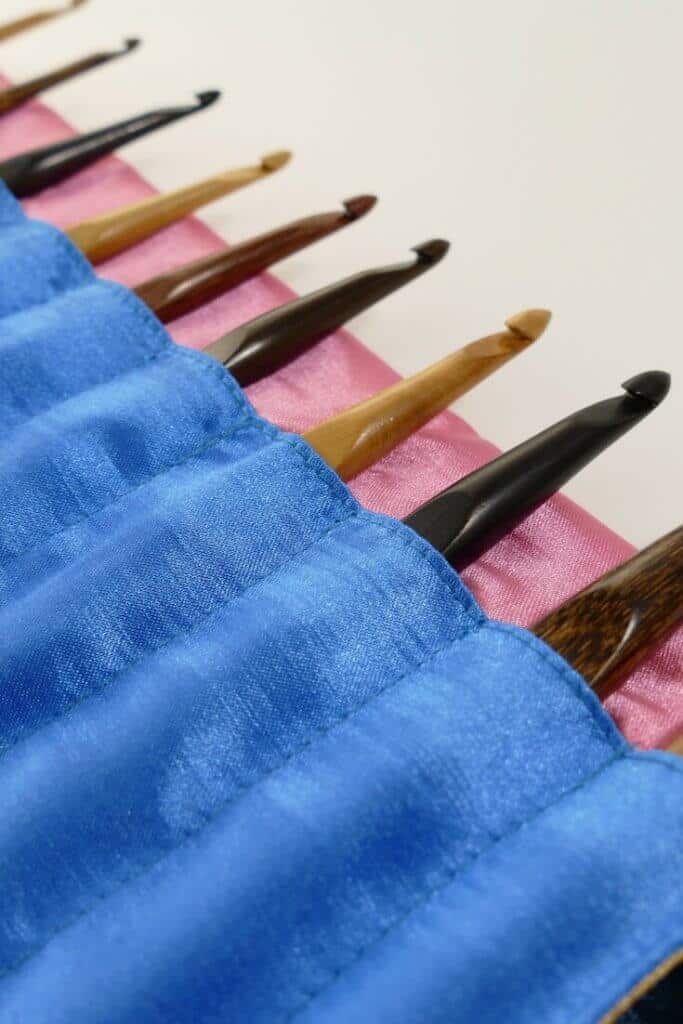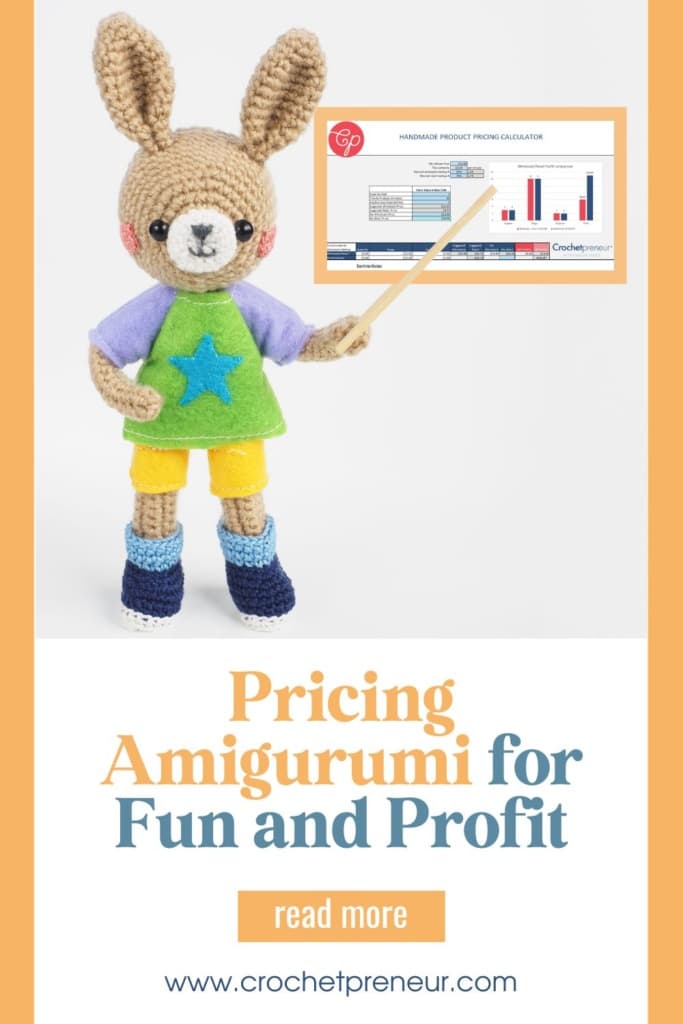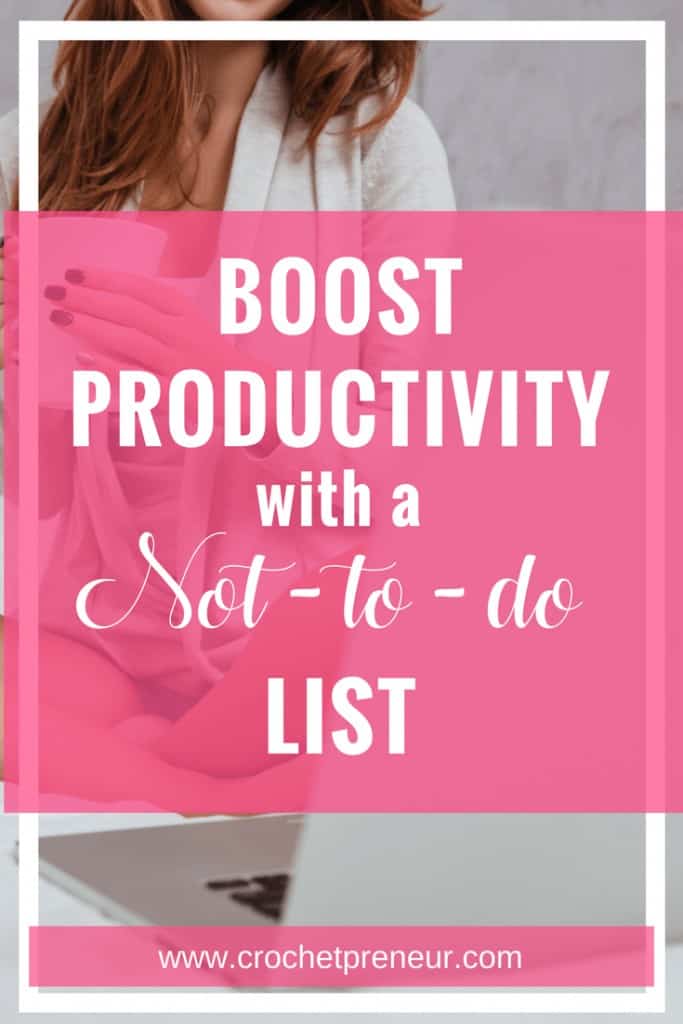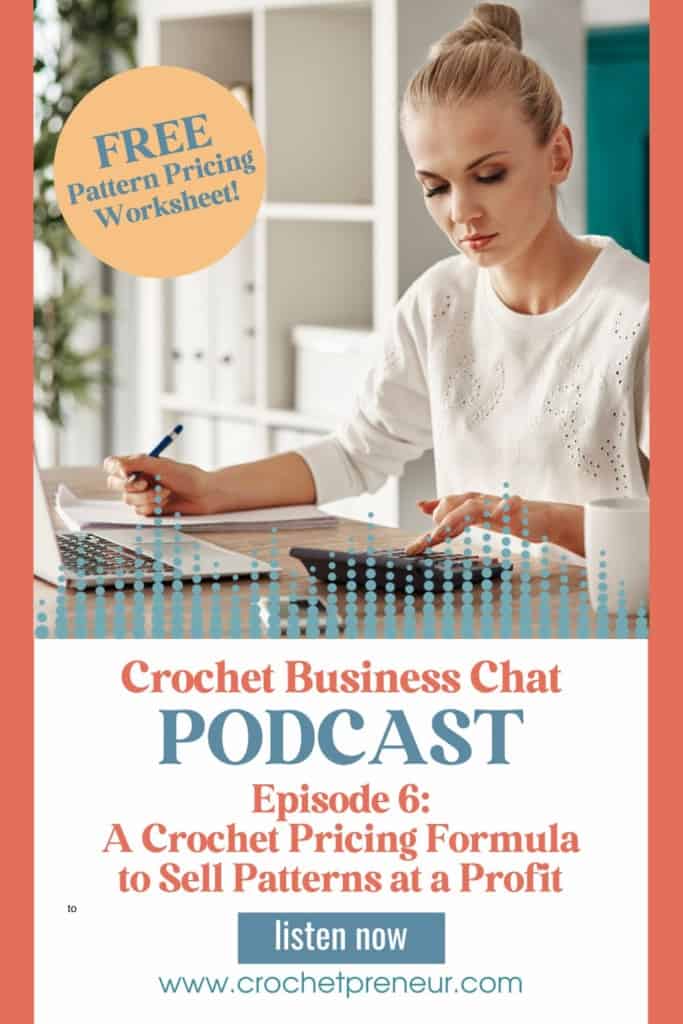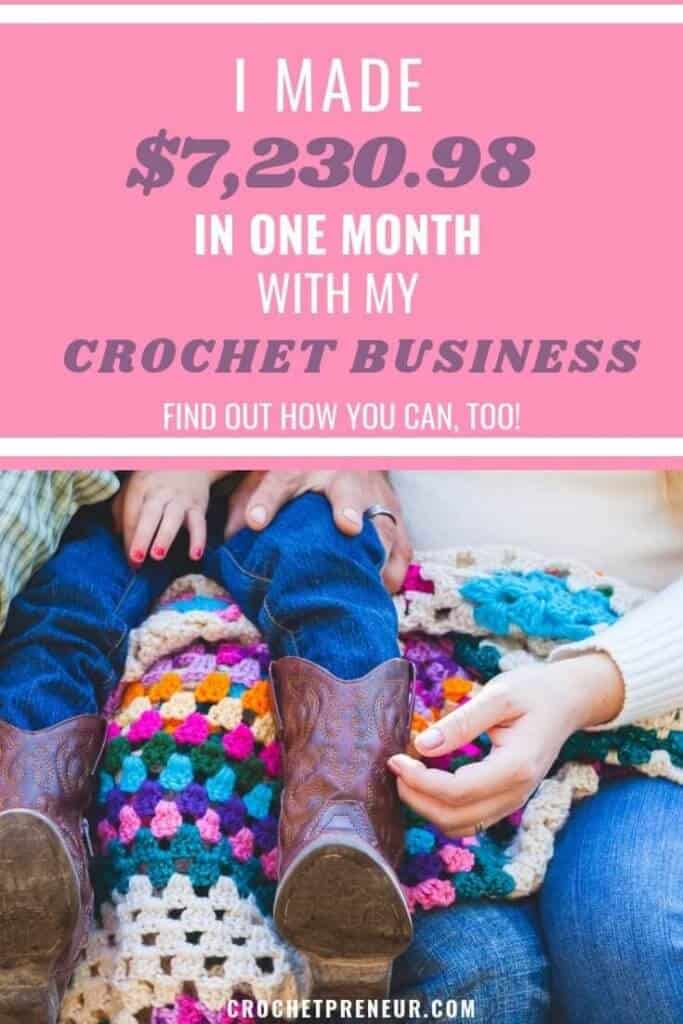This episode of Crochet Business Chat originally aired almost four years ago. But it addresses a question that continues to pop up in the crochet community almost daily: “Can you sell crochet items from someone else’s pattern?”
Can I sell items from other people’s designs? What’s the legal answer? What’s the ethical answer? What’s the reasoning behind all of this?
Well, it all comes down to what’s legal and what’s ethical, right? Let’s talk about all that copyright stuff PLUS consider where the restriction, “For personal use only. Do not sell products made from this pattern” comes from, and some dos and don’ts for crochet product sellers and designers.
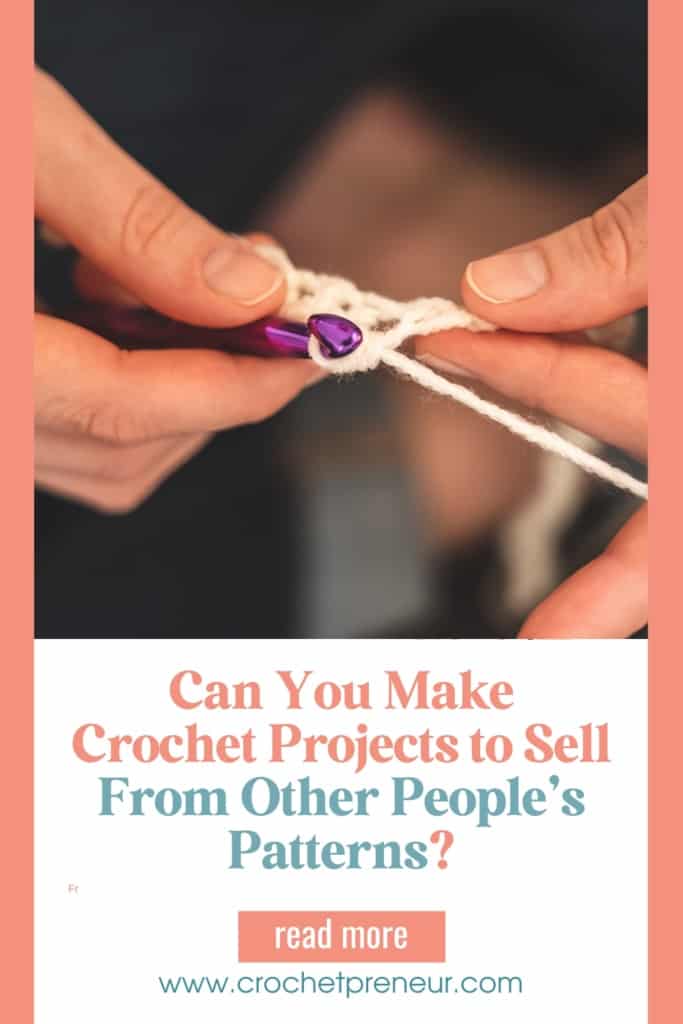
Copyright Law for Crochet Designers
Important note: This article does not constitute legal advice and is offered for informational purposes only. If you have any questions about your individual situation, please seek advice from an intellectual property attorney in your local area.
Copyright laws for crochet designers and makers is often both misunderstood and misused. It causes otherwise sane and joyful makers to become fearful, controlling, even, bullying.
Let’s put an end to that by making some things clear, easy to understand and easy to implement, shall we?
First, what do we mean by copyright? Well, a copyright is a legal protection that is given to the creator of a tangible item. That creator has the right to gift, sell, donate…do whatever she will with her work and, also, has the right to sue anyone who copies, sells, or distributes that tangible item to others.
What is protected by copyright?
When we discuss copyright protections for crochet designers, this means that the written crochet pattern in the form of a tangible, PDF or printed, document is covered by copyright laws.
Along with the written pattern, any charts and photos are covered by copyright as well and the copyright goes into effect as soon as pen is put to paper. The symbol ©, date, and copyright owners name are not required in order for the tangible items to be copyrighted – it is an automatic protection.
However, those notations do help if a case is ever brought to court. For more information on copyrighting your creative works, check out this article from attorney, Andrea Vetter, What You Need to Do to Copyright Your Work.
Does this mean you can sell crochet items made from someone else’s pattern?
Yes, absolutely! There is no specific legal language or precedent that shows that a maker of a product can not sell that product however he/she chooses.
The sticky situations happen when designers of patterns add restrictive language to their copyright notifications that stating that the pattern is for personal use only, finished products can not be sold either online or in person, you must credit the designer when selling finished products, and some even specify the price at which you may or may not sell your finished pieces.
Do they have legal rights to make such restrictions? As far as I can tell, they do not.
Do you have a legal obligation to abide by those restrictions? Again, it doesn’t seem so…but tread lightly.
I believe the ethical thing is to always honor and abide by the wishes of the designer. If you can’t do that, my suggestion would be to seek out a design from a different artist.

special designed for handmade sellers
Get Your Product Pricing Calculator
Opt to price your products based on time, stitches, or yardage and find the suggested retail and wholesale prices PLUS get graphic charts showing your per-product profits. It’s an indispensable tool for all handmade sellers!
Why do Designers use Phrases Like “For Personal Use Only” and Other Restrictions?
Without asking, there’s no real way to know why one designer chooses to add restrictions and another doesn’t. It can be as simple as they’re just doing it because they’ve seen others do the same.
Often, these restrictions come from a place of fear – fear of losing sales, fear of competition, fear of losing control of their designs. And I get that. Each designer might feel differently but, as creatives, we often feel a special attachment to our designs and to the work we put into them and having ‘competition’ can feel like a threat.
Ultimately, that’s an issue for the designer to deal with and not something makers need to carry for them…and that fear is like a virus, it’s catchy. So, I just prefer to stay away from that kind of thinking.
Instead, I prefer to hold my designs loosely, to share widely, and to live by the mantra, “I can’t make all the hats.” There are enough customers to go around for each of us and each seller has his or her own following – let’s all benefit from great designs!
However, on my designs, I do ask for credit. I don’t get militant or threatening about it, I simply ask that sellers link back to my designs when possible so that anyone interested in the pattern can find it and I receive credit for the work I put it…as simple as that.
Can a Designer Specify What I Can Charge?
From the research I’ve done, the answer is no. It is standard practice for manufacturers to set a suggested retail price…but designers are not manufacturers, makers are.
Again, this need to control what others do with their own businesses seems to come from a place of misinformation and, possibly, overreaching entitlement.
As far as I can tell, if you make a product, you are free to charge what you think it is worth – no commercial license or pricing agreement required. If you find information to the contrary, please let me know and I’ll be sure to share it with other.
Dos and Don’ts for Crochet Sellers
When it all comes down to it, here are some dos and don’ts when it comes to selling products from someone else’s pattern.
DOs
- Do your research before you purchase a pattern. If the designer states that you can not sell the finished product, move on and find a different pattern.
- Do honor the request of the designer, either way. It’s not worth creating a rift by going against what is asked of you.
- Do give credit to the designer with a simple byline at the end of your listings, a sticker on product tags, or a tag on social media.
- Do reach out and ask the designer for permission, if you’re unsure.
- Do freely share links to the designs of your favorite designers, this helps them immensely.
DON’Ts
- Do not copy, distribute, or alter and claim as your own any pattern that you have purchased or gotten for free.
- Do not use or share a designer’s photos or charts in your own marketing efforts.
- Do not copy the written pattern and share it online when seeking help to work up a pattern.
- Do not harass a designer even when you disagree with them. We’re all just doing our best.
- Do not publicly shame the designer – it’s unseemly and makes you look bad.
- Do not hesitate to reach out to the designer to thank him/her for creating beautiful, quality works.
A Note to Designers
I know it’s hard to give up control of your designs. I know it difficult to see others selling your designs for half the price that you’re selling them for. And I know the fear that comes from worrying about your own finances and business.
I want to encourage you to hold your designs loosely…to let them out into the world so others can enjoy them. And I want you to recognize that there is an inherent value in purchasing a product that is made by the designer. So, it’s OK if you’re charging more than someone else – your people will pay.
It’s perfectly within your rights to want credit where credit is due, but check in with your own heart every so often and ask…am I operating out of fear? How does that feel?
How would it feel to see others benefiting from the sales of your designs compared to the feeling that comes from holding on so tightly, monitoring others, and threatening them for breaking your rules.
I just prefer the former and I hope you can enjoy the freedom that comes from doing the same. Either way, it is your business, it is your connection to your buyers, and your decision. Choose wisely and in a way that feels life-giving to you…and go with it.
Can I be featured on the podcast?
Want to ask a question and have the opportunity to get your business featured with a link to your website? You can ask your questions here.
Have expertise that you think would be helpful to share with Dear Crochetpreneur listeners? Let me know all about you here.
Further Listening and Reading
- All Dear Crochetpreneur Episodes
- What Crochet Designers Can Do About Intellectual Property Theft
- 5 Ways Crocheters Break the Law Every Day
- Someone Stole My Design! How to Respond to Copycats


